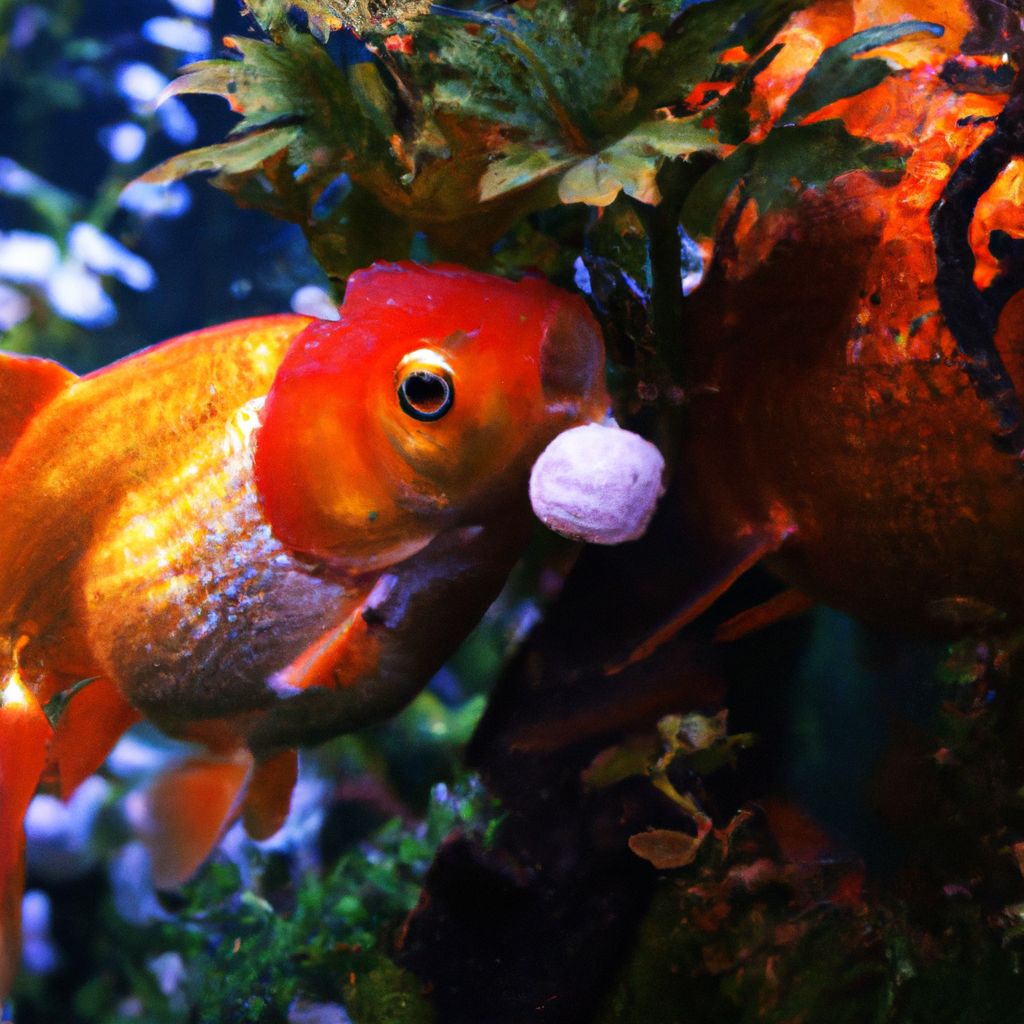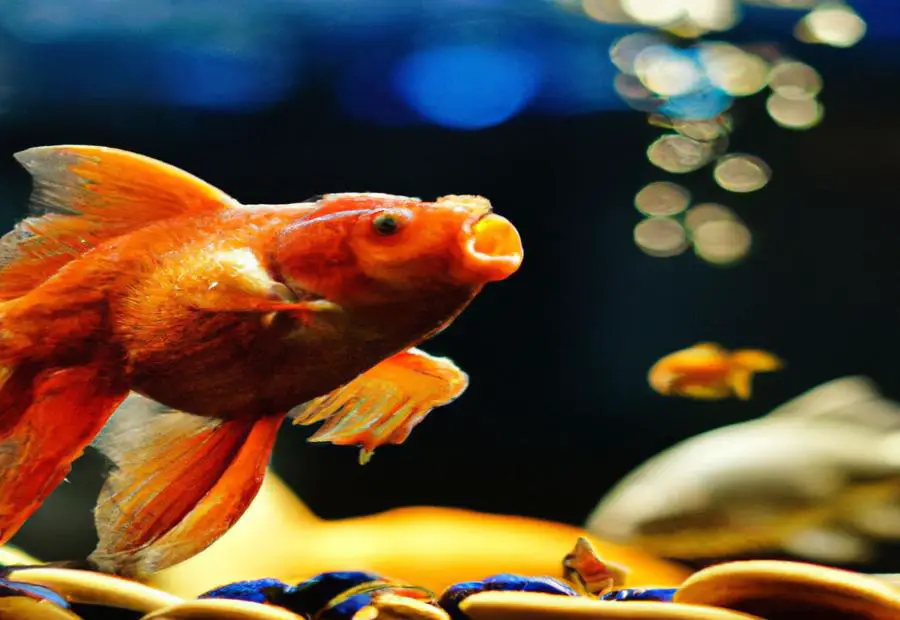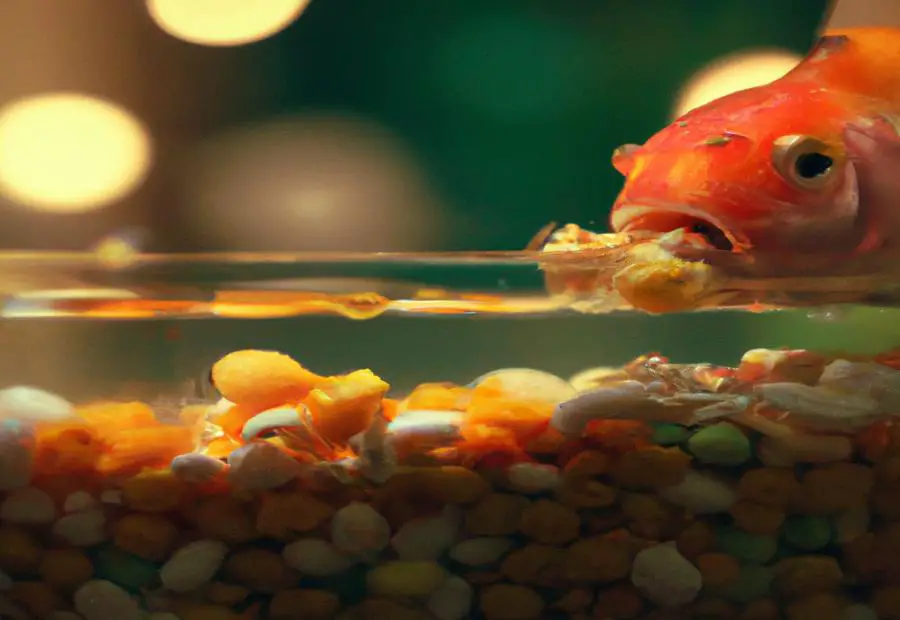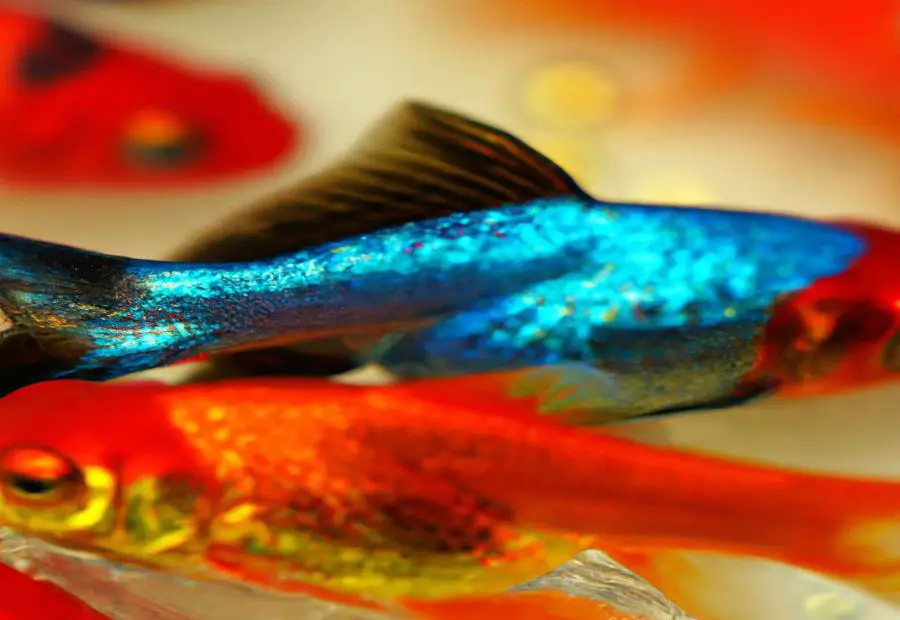Last Updated on 7 months by admin

Goldfish are popular pets known for their vibrant colors and graceful movements. As responsible pet owners, it is important to provide them with a nutritious diet that meets their specific nutritional needs. However, there is often confusion regarding the compatibility of different types of fish food. In this article, we will address the common question: Can goldfish eat cichlid food?
To understand whether goldfish can consume cichlid food, it is crucial to first understand the normal diet of goldfish. Goldfish are omnivorous creatures that thrive on a varied diet consisting of both plant matter and protein-rich foods. They typically consume a mixture of commercial goldfish flakes, pellets, and treats.
On the other hand, cichlid food is specifically formulated to meet the dietary requirements of cichlids, which are a different species of fish. Cichlid food is often made up of ingredients that cater to the specific needs of cichlids, such as high levels of protein and unique mineral compositions.
While goldfish and cichlids may have overlapping dietary preferences, it is generally not recommended to feed goldfish cichlid food. Goldfish have different nutritional requirements compared to cichlids, and a diet primarily comprised of cichlid food may lack essential nutrients essential for the optimal health of goldfish.
Feeding goldfish cichlid food on a regular basis can lead to potential negative effects, such as nutritional deficiencies or imbalances. These can result in issues like organ problems, poor growth, weakened immune system, and overall compromised health.
To ensure the well-being of your goldfish, it is best to provide them with a well-rounded diet specifically formulated for goldfish. This includes a quality commercial goldfish food that meets their nutritional needs. you can supplement their diet with fresh vegetables like peas or lettuce, and occasional treats like brine shrimp or bloodworms.
Key takeaway:
- Understanding the diet of goldfish is crucial: Goldfish have specific nutritional requirements that need to be met in order for them to thrive. It is important to know what they normally eat and what nutrients they need.
- Not all fish foods are suitable for goldfish: Cichlid food may not provide the optimal nutrition for goldfish. Goldfish have different dietary needs, so it is important to choose the right food specifically formulated for goldfish.
- Providing a balanced diet is essential: It is recommended to feed goldfish a diet that includes a combination of commercially available goldfish food and other suitable food items to ensure they receive all necessary nutrients for their health and well-being.
Understanding the Diet of Goldfish

Photo Credits: Bettafishworld.Com by Alexander Anderson
Understanding the diet of goldfish is crucial to their health and overall well-being. It is important to consider the following key points:
- Variety: Goldfish thrive on a diverse diet that includes both commercially available goldfish flakes or pellets and fresh vegetables such as peas, lettuce, and spinach.
- Protein: Goldfish require a good source of protein, which can be obtained through high-quality fish food containing ingredients such as shrimp, krill, or worms.
- Avoid overfeeding: To prevent overeating, it is important not to overfeed goldfish. It is recommended to feed them small portions multiple times a day and remove any uneaten food after a few minutes.
- Supplements: Occasionally, goldfish can benefit from supplements like spirulina or multivitamin pellets. These supplements can improve their well-being and strengthen their immune system.
Fact: Did you know that goldfish have a unique digestive system that allows them to eat food without chewing? Instead, they swallow their food whole and use their specialized teeth and intestines to efficiently extract nutrients.
What Do Goldfish Normally Eat?
Goldfish normally eat a variety of foods including:
- Flakes or pellets formulated specifically for goldfish, which provide essential nutrients such as protein, carbohydrates, and vitamins.
- Fresh or frozen vegetables, such as peas, lettuce, and spinach, which provide fiber and additional nutrients.
- Live or frozen foods like brine shrimp or bloodworms, which are rich in protein and can be offered as occasional treats.
- Insects or small crustaceans that are safe for goldfish and mimic their natural diet.
- Small amounts of fruits like oranges or watermelon for added variety, although these should be given sparingly due to the high sugar content.
Pro-tip: It is important to offer a balanced diet for goldfish to ensure their overall health and well-being. A combination of commercial flakes or pellets, along with occasional fresh or frozen foods, provides the necessary nutrients for optimal growth and vitality. Remember to feed them in appropriate portions and avoid overfeeding, as excess food can lead to water quality issues and digestive problems.
Key Nutritional Requirements of Goldfish
When it comes to the key nutritional requirements of goldfish, it is important to provide them with a well-balanced diet that meets their specific needs.
| Nutritional Requirement | Description |
| Protein | Goldfish require a diet high in protein to support growth and overall health. Opt for fish-based protein sources such as shrimp or fish pellets. |
| Fat | Adequate fat intake is essential for goldfish to maintain healthy skin and organs. Include small amounts of fatty foods like brine shrimp or bloodworms. |
| Carbohydrates | While goldfish do not have a high carbohydrate requirement, including some plant-based foods like peas or lettuce can provide them with necessary fiber. |
| Vitamins and Minerals | Goldfish require a variety of vitamins and minerals to support their immune system, metabolism, and overall well-being. Look for fish foods that are fortified with essential vitamins and minerals. |
| Water Quality | High-quality water is crucial for goldfish to thrive. Clean and well-maintained aquarium water helps ensure proper digestion and nutrient absorption. |
Providing goldfish with a diet that meets these key nutritional requirements of goldfish is essential for their health and longevity. Remember to feed them the appropriate amount of food based on their size and age. Additionally, always monitor their behavior and adjust their diet if necessary. It is recommended to consult with a veterinarian or aquatic specialist for specific nutritional guidance for your goldfish.
Exploring Cichlid Food

Photo Credits: Bettafishworld.Com by Dennis Hall
When exploring cichlid food, it is important to consider the type that suits your cichlid’s dietary needs. There are various options available, such as pellets, flakes, frozen food, live or frozen foods, and vegetables.
Pellets are specifically formulated for cichlids and provide a balanced diet with essential nutrients. Flakes, on the other hand, offer variety in texture and can be easily consumed by most cichlids. Frozen food is a good choice as it contains natural ingredients and has a high protein content for optimal growth. Live or frozen foods can provide a natural feeding experience and boost color and vitality.
For herbivorous cichlids, vegetables can be a beneficial supplemental food option, as they are rich in fiber. It’s important to note that different cichlid species have varying dietary requirements, so it is essential to research the specific needs of your cichlid.
When selecting cichlid food, ensure that it is fresh and free from contaminants, as this can affect the health of your fish. Providing a diverse diet and occasionally supplementing with live or frozen foods can enhance your cichlid’s well-being and overall coloration.
If you need assistance in determining the best food options for your specific cichlid species, it is always a good idea to consult with a knowledgeable aquarium specialist.
What is Cichlid Food?
Cichlid food refers to specially formulated food designed specifically for cichlid fish. The purpose of this food is to meet the unique nutritional requirements of cichlids and support their healthy growth and development. Typically, cichlid food contains a well-balanced combination of proteins, fats, carbohydrates, as well as essential vitamins and minerals necessary for their overall well-being. These food options come in different forms such as pellets, flakes, and freeze-dried formats, catering to the diverse feeding habits of cichlids.
However, it is crucial to understand that cichlid food is specifically tailored for cichlid fish species and may not be suitable for other fish types, including goldfish. Goldfish have different dietary needs, and feeding them cichlid food may not provide the necessary nutrients they require. To ensure goldfish receive appropriate nutrition, it is recommended to choose food specifically formulated for goldfish.
For optimal goldfish diet, it is advisable to select high-quality goldfish food containing a balanced blend of proteins, carbohydrates, and essential vitamins and minerals. Additionally, supplementing their diet occasionally with live or frozen foods like brine shrimp or bloodworms can enhance their nutrient intake and provide a varied nutrient profile.
Remember, selecting the right food is vital for maintaining the health and vitality of your goldfish. Always opt for food designed specifically for their dietary needs and follow the recommended feeding guidelines to ensure their well-being.
Lastly, it is essential to remember to feed your goldfish a diet suitable for their species to promote their overall health and happiness.
Composition and Nutritional Content of Cichlid Food
The composition and nutritional content of cichlid food, including the high-quality proteins, carbohydrates, and fats, can greatly impact the health and well-being of goldfish. When considering cichlid food as a potential diet option, it is important to understand the specific needs of goldfish.
The nutritional content of cichlid food varies depending on the brand and specific formula, so it is crucial to check the packaging. Ensure that the food contains the necessary vitamins, minerals, and essential nutrients that goldfish require for their overall health and vitality.
Proteins in cichlid food play a critical role in the growth and development of goldfish as they provide the essential amino acids necessary for muscle development and repair. The protein content should be around 30-40% to meet the dietary needs of goldfish effectively.
Carbohydrates in cichlid food provide a source of energy for goldfish, but it is important to note that their ability to digest complex carbohydrates is limited. Therefore, the carbohydrate content should be minimal in their diet.
Fats in cichlid food serve as a concentrated source of energy and provide essential fatty acids for goldfish. To ensure optimal growth and development, the fat content should be around 5-10% in their diet.
Vitamins and minerals are crucial for the overall health and well-being of goldfish. It is important that the cichlid food contains a balanced mix of vitamins and minerals, including vitamin C, vitamin D, calcium, and phosphorus.
When considering cichlid food for goldfish, carefully examine the composition and nutritional content. Ensuring that the food meets the specific dietary requirements of goldfish is essential to support their growth, health, and vitality. Always consult with a veterinarian or aquatic specialist for guidance and recommendations on the best diet for goldfish.
Compatibility of Cichlid Food for Goldfish

Photo Credits: Bettafishworld.Com by Ronald Ramirez
| Cichlid Food | Compatibility for Goldfish |
|
Specialized Cichlid Pellets |
Not suitable for goldfish due to different nutritional needs. |
|
Flake Food |
Can be fed to goldfish occasionally but not recommended as a staple diet. |
|
Vegetables and Greens |
Highly compatible with goldfish diet, especially lettuce, peas, and spinach. |
|
Live/Frozen Foods |
Goldfish can consume these foods, but they should not be the primary diet. |
|
Pellets or Flakes for Goldfish |
Most suitable option for goldfish as it caters to their specific nutritional requirements. |
Goldfish and cichlids have different nutritional needs. While goldfish can consume some cichlid foods, it is not recommended as a staple diet. Specialized cichlid pellets are not suitable for goldfish. Instead, goldfish should be fed flakes or pellets specifically designed for them. Vegetables and greens like lettuce, peas, and spinach are highly compatible with the goldfish diet and can be incorporated. Live or frozen foods can be given to goldfish occasionally, but they should not be their primary diet. It is important to prioritize the nutritional requirements of goldfish to ensure their well-being.
Can Goldfish Eat Cichlid Food?
Can goldfish eat cichlid food? Yes, goldfish can consume cichlid food. However, it is important to note that cichlid food is specifically formulated for the nutritional requirements of cichlids, which may not align perfectly with the needs of goldfish.
Feeding goldfish cichlid food should be done sparingly and as a supplement to their regular diet. Cichlid food is usually high in protein and may have a higher fat content, which can lead to digestive issues and obesity in goldfish if consumed in large quantities.
It is recommended to prioritize a well-balanced diet for goldfish that consists of a high-quality goldfish pellet or flake food. This type of specific goldfish food is formulated to meet the nutritional needs of goldfish, providing them with the right balance of proteins, carbohydrates, vitamins, and minerals.
In a similar vein, I once experimented with feeding cichlid food to my goldfish. Initially, they seemed to enjoy the change in flavor but soon started experiencing digestive problems. It became evident that cichlid food was not suitable for their sensitive digestive systems. From that experience, I learned the importance of sticking to a goldfish-specific diet to ensure their health and well-being.
Potential Effects of Feeding Goldfish Cichlid Food
- Feeding goldfish cichlid food can potentially lead to digestive issues. Goldfish have specific dietary needs and their digestive systems are adapted to process certain types of food. Cichlid food may contain ingredients that are not suitable for goldfish, such as higher protein levels or different types of fillers.
- Cichlid food is formulated to meet the nutritional needs of cichlids, which may differ from the nutritional requirements of goldfish. Feeding cichlid food to goldfish on a regular basis can result in a nutritional imbalance, as goldfish require a specific balance of protein, carbohydrates, and fats.
- Cichlid food is typically higher in protein content compared to goldfish food. Feeding goldfish excessive amounts of protein can lead to obesity and weight gain. Goldfish are prone to overeating and improper diet can lead to health complications, such as swim bladder issues.
- Feeding them cichlid food may not provide the necessary nutrients and vitamins required for optimal growth. This can result in stunted growth and other developmental issues.
- Feeding goldfish cichlid food can lead to increased waste in the aquarium, impacting the water quality. Poor water quality can be detrimental to the overall health and well-being of goldfish.
These potential effects highlight the importance of choosing the right type of food specifically designed for goldfish to ensure their proper nutrition and overall health.
Optimal Food for Goldfish
When it comes to feeding our goldfish, choosing the optimal food is crucial for their health and well-being.
In this section, we’ll dive into the realm of goldfish nutrition and explore the recommended diet for these vibrant aquatic creatures.
We’ll also uncover the benefits of supplementing their diet with other foods, leading to a thriving and happy goldfish.
So, let’s uncover the secrets to providing our goldfish with the nourishment they need to flourish!
Recommended Diet for Goldfish
The recommended diet for goldfish, known as the Recommended Diet for Goldfish, consists of a balanced and varied selection of foods that meet their nutritional needs.
- Aquatic Plants: Goldfish should be fed a diet rich in aquatic plants, which are a source of essential vitamins and minerals.
- High-Quality Goldfish Pellets: Goldfish pellets specifically formulated for their dietary requirements are an excellent staple food. Look for pellets that contain a balanced ratio of protein, fats, and carbohydrates.
- Fresh Vegetables: Incorporate fresh vegetables into their diet such as peas, lettuce, and spinach. These vegetables provide fiber and essential nutrients.
- Live or Frozen Foods: Goldfish can be fed live or frozen foods such as brine shrimp or bloodworms, which provide them with additional protein.
- Occasional Treats: Treats like small pieces of fruits (without seeds) or freeze-dried foods can be given occasionally to add variety to their diet.
It is important to feed goldfish small portions multiple times a day, as their digestive system works best with a consistent intake of food.
Remember to monitor your goldfish’s eating habits and adjust their diet accordingly. A balanced diet with adequate nutrients will promote their overall health and well-being.
Supplementing Goldfish Diet with Other Foods
Supplementing a goldfish diet with other foods can provide additional nutrients and variety in their diet. Incorporating a variety of vegetables, fruits, protein sources, and commercial fish foods can enhance the nutritional diversity of your goldfish’s diet and promote their overall health and well-being.
- Vegetables: Goldfish can benefit from eating a variety of vegetables such as peas, lettuce, zucchini, and spinach. These vegetables can be boiled or blanched to make them easier for goldfish to digest.
- Fruits: Occasional treats of fruits like oranges, apples, and grapes can provide essential vitamins and minerals. It is important to remove any seeds or pits that may be harmful to goldfish.
- Protein: Adding protein-rich foods like bloodworms, brine shrimp, and daphnia can be beneficial for goldfish growth and development. These can be given as frozen or live options.
- Commercial Fish Food: High-quality commercial fish foods specifically formulated for goldfish can also be used to supplement their diet. Look for brands that contain a balance of proteins, fats, and carbohydrates.
- Homemade Fish Food: Some fish owners prefer making their own fish food using ingredients like gelatin, fish, and vegetables. However, it is important to ensure the homemade food meets the nutritional needs of goldfish.
Some Facts About Can Goldfish Eat Cichlid Food:
- ✅ Goldfish can eat cichlid food, but it is not recommended as a regular diet. (Source: Our Team)
- ✅ Cichlid food has a higher concentration of protein, which may lead to health issues in goldfish over time. (Source: Our Team)
- ✅ Goldfish have specific nutritional requirements that differ from cichlids. (Source: Our Team)
- ✅ It is best to provide goldfish with food formulated especially for their needs. (Source: Our Team)
- ✅ Goldfish can occasionally eat cichlid pellets, but it should not be their primary diet. (Source: Our Team)
Frequently Asked Questions
Can goldfish eat cichlid food bought from pet stores?
No, goldfish should not eat cichlid food bought from pet stores. Cichlid food is formulated specifically for the nutritional needs of cichlids, which require a higher protein and fat content. Goldfish need more plant-based proteins and carbohydrates in their diet. It is best to choose food formulated especially for goldfish.
Can goldfish eat household foods like rolled oats or wheat flour?
No, goldfish should not be fed household foods like rolled oats or wheat flour. These foods contain starch and grain-based ingredients that may cause buoyancy problems in goldfish. It is important to choose high-quality flake or pellet foods that contain fish meal and krill meal as the main ingredients to provide the necessary nutrition for goldfish.
Are betta fish compatible tank mates for goldfish?
No, betta fish are not compatible tank mates for goldfish. Goldfish are coldwater fish, while betta fish are tropical fish. They have different water temperature requirements to thrive. It is best to keep them in separate tanks to provide appropriate conditions for each species.
What are some suitable tank mates for goldfish?
Some suitable tank mates for goldfish include guppy fish, white cloud minnows, and otocinclus or cory catfish. These fish are relatively small and peaceful, making them compatible with goldfish. It is important to consider the water temperature and the compatibility of fish species when choosing tank mates for goldfish.
Can goldfish eat frozen bloodworms as a treat?
Yes, goldfish can eat frozen bloodworms as an occasional treat. Bloodworms are a great source of nutrition for goldfish, as they are high in protein and contain essential vitamins and minerals. However, it is important not to overfeed goldfish with bloodworms or any other food.
What is the best food for goldfish?
The best food for goldfish is a high-quality flake or pellet food specifically formulated for goldfish. This type of food provides complete nutrition with essential proteins, fats, and carbohydrates. It is important to feed goldfish 2-3 quick meals per day, ensuring they finish the food within 2-3 minutes to prevent overfeeding and water pollution.

